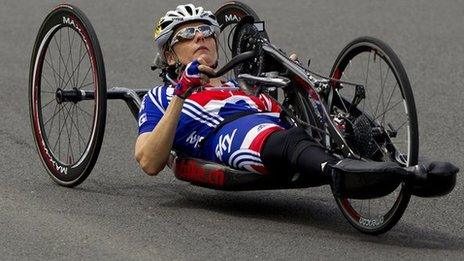Private force outnumbers miltary at Paralympic Games
- Published
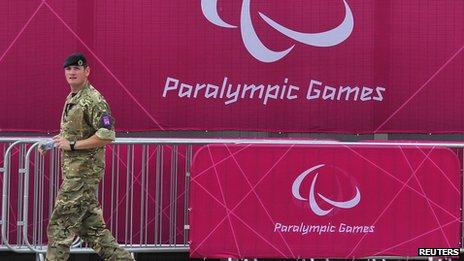
There will be fewer armed forces personnel on duty during the Paralympics than worked at the Olympics
People going to the Paralympic Games will see fewer military uniforms than those who were at the Olympic Games.
A "sizeable chunk" of the armed forces who worked at the Olympics have been "stood down" and the majority of security staff at the Paralympics will come from a private force.
The reduction was confirmed during a briefing by London 2012 officials, five days before the Paralympic Games open.
There will be 3,500 armed forces personnel on duty and 1,000 in reserve.
On top of that number, 4-5,000 private security guards will also be working at the Games, reversing the profile of the Olympics security force where the military was in the majority.
Three days before the Olympic Games opened, the figure given for the number of military personnel deployed was 18,200 while G4S had just under 6,000.
The first official Paralympic Games took place in Rome in 1960 but the first Paralympic sports event was held at Stoke Mandeville Hospital in 1948.
It was the brainchild of Professor Ludwig Guttmann, who introduced sport into his rehabilitation programme for patients at the National Spinal Injuries Centre there.
Locog chairman Lord Coe said the Paralympic Games were "coming home" and added: "There'll be great sport and the opportunity to change some attitudes and misconceptions.
"We are only halfway through an exciting summer of sport. We have more competing nations than ever before and more medal events than the Olympics.
"There are also countries like Albania, Antigua and Rwanda competing in the Paralympics for the first time.
"A lot of this is due to the classification system which enables athletes to compete on equal terms with others based on their abilities."
The venues for the Games and Athletes' Village were built with the Olympic and Paralympic Games in mind.
Locog chief executive Paul Deighton explained: "Nothing has been fundamentally changed because it failed at the Olympics but some things have been refined.
"For example the signage - we worked out where people got lost so have improved that and we also learned a lot about crowd movement and how to steward it.
"Also the spectator experience where we learned how people want to spend their time, what they really enjoyed in the venues and in the Park - things like having their photos taken with the Olympic torch and hanging around in the venues.
"In the Athletes' Village, where there is already a great atmosphere, we now have a wheelchair repair centre while we have converted some of the athletes buses to make them more accessible.
"Also with our volunteer Games Makers, just over two-thirds of them are new with one-third carried over from the Olympics. We expect the newcomers to inject a fresh energy and excitement."
One issue which raised its head early on during the Olympics was the number of empty seats seen at venues.
There will also be empty seats during the Paralympics but this will be because of areas of venues reserved for spectators with day pass tickets.
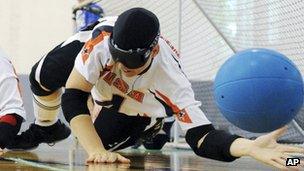
Goalball will take place in the Copper Box, which staged handball during the Olympics
The Olympic Park passes, which were also produced for ExCel, allow holders access to any venue, other than the Olympic Stadium, Aquatics Centre and Velodrome, which has seats available.
Mr Deighton explained: "If you take the venues like goalball where effectively you have got a mixture of people in that venue and about a quarter of seats will be general admission for people who want to watch that sport - then there will be about three-quarter of the seats that will be for people who are rotating through on a day pass.
"The whole point is to give people a chance to sample different sports so you will see a churn through the biggest chunk of most of those venues. You will see some empty seats there as people move through them and try different sports."
This week different passes were also sold giving people entry to the Olympic Park but not to any venues.
So far around 2.3m of the 2.5m available tickets have been sold with half of the remainder expected to go on sale before the Games and the other half during them.
"We are down to the last two or three per cent and only want to sell where seats exist and have a good view," Mr Deighton said.
"Tickets from the friends and family and follow my team programmes are likely to come back on to the market as the Games progress as well ones from the allocation set aside for athletes to watch fellow athletes, broadcasters and press and officials from the national sports federations."
The Games run from 29 August to 9 September.
- Published24 August 2012
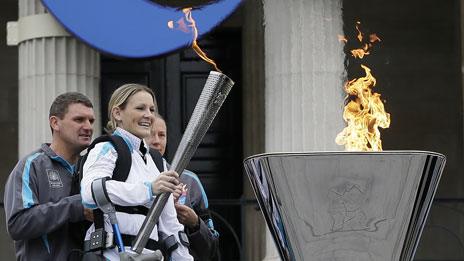
- Published23 August 2012
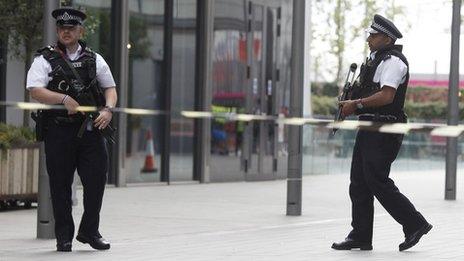
- Published20 August 2012
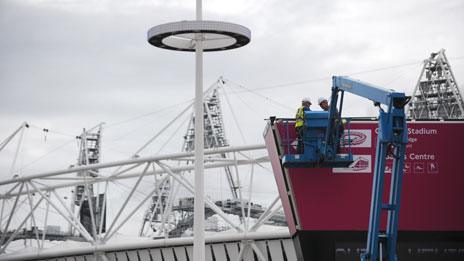
- Attribution
- Published5 September 2016
